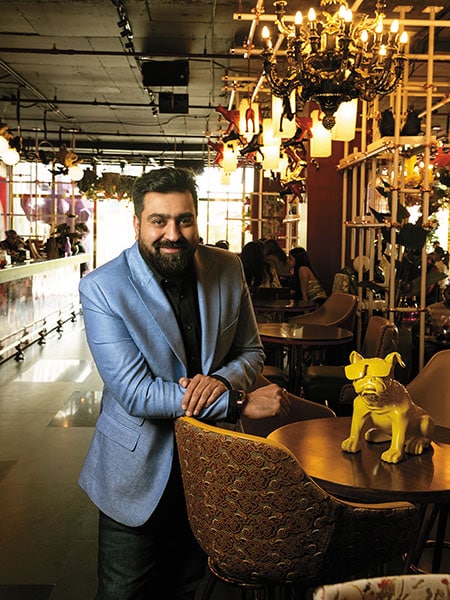
You have to keep reinventing the wheel: F&B entrepreneur Priyank Sukhija
F&B entrepreneur Priyank Sukhija, who owns premier hangouts like Lord Of The Drinks, Tamasha and JLWA, talks about what it takes to survive in the industry for 20 years
 Priyank Sukhija, proprietor of brands like Lord of the Drinks, JLWA and Plum By Bent Chair, says that India will soon see a lifestyle shift where people will eat out almost every day
Priyank Sukhija, proprietor of brands like Lord of the Drinks, JLWA and Plum By Bent Chair, says that India will soon see a lifestyle shift where people will eat out almost every dayImage: Madhu Kapparathp
Priyank Sukhija was born into a family of lawyers and, if not for his dyslexia, would have probably ended up as one. “Being a lawyer with a reading disability would have been a terrible idea,” says the 39-year-old, who invested in a bowling alley in 1997 instead. But it was canned even before its opening as the government banned operations out of basements following the fire tragedy at the Uphaar cinema hall in Delhi.
At 19, with capital from his father, he set up a restaurant (Lazeez Affaire in New Delhi’s Malcha Marg) to foster his entrepreneurial zeal. Twenty years on, Lazeez Affaire is thriving in an industry that sees fast churn, and Sukhija’s portfolio at the `234-crore First Fiddle Pvt Ltd has expanded to 11 brands (including Lord of the Drinks, Tamasha and Plum By Bent Chair) with 30 outlets across four cities.
Among the most prolific restaurateurs in the country, Sukhija talks to Forbes India about his expansion plans and takeaways from spending two decades in the industry. Edited excerpts:
Q How have you seen the F&B industry change over 20 years?
The size has expanded, but even now we’ve only seen the tip of the iceberg. If 1 percent of Delhi decides to come out once a week, we don’t have enough restaurants to cater to them. Plus, people look at F&B spends as not an expense but a lifestyle matter. Do you know the price of your favourite item at your favourite restaurant? No, because when people eat something they like, they are willing to pay for it. Unlike buying a car or a house, they don’t have to think twice. Our grandparents never went out, our parents took us out once in a month, we go out about once a week and our kids will probably go out every day. Singapore is now selling apartments without kitchens, so you get to eat out every day. That shift will come to India too.
Q With mushrooming restaurants, how does one build customer loyalty?
You have to reinvent the wheel all the time. If you have a product and you sit back because it’s making money, that’s not going to last forever. The customer is so smart today, and the kind of restaurants that used to make money five to eight years ago were very different from what they are now. For instance, 10 years ago, when I would do bars, we used to sell a lot of straight drinks—vodka, whisky, beer etc. Now, you have to be on top of your wines and cocktails. At a place like Plum, 25 percent of my liquor sales come from cocktails and wines. And looking into the future, I feel the number would go up to 60 to 70 percent. Also, earlier, cocktails for us meant a Bloody Mary or Cosmopolitan. But now every place needs to have a signature cocktail that needs to change every season.
Q Making money is tough in the F&B sector now, with a lot of restaurants running into losses and shutting down. How doyou think the industry can turn around?
It’s not that the restaurants aren’t making money. We closed the last fiscal at `234 crore, a 30 percent increase from the previous fiscal, which we ended at `182 crore. Lord Of The Drinks and Tamasha in Mumbai have paid us back in the first year itself. Plum in Delhi’s Aerocity gave us our money back in four months; it’s been the most successful in terms of return on investment. Having said that, we’ve also had some failures. You’ve got to realise that even after many restaurants, you’ll do a few bad ones; better to identify why something went wrong.





